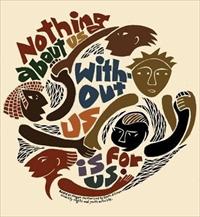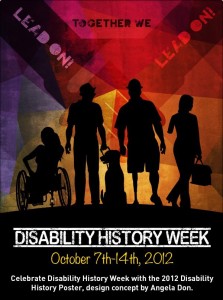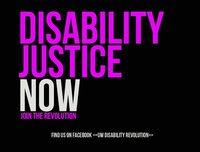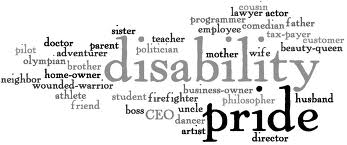So, Do You Really Need That Cane? Why, Yes. Yes I Do.
I found out this spring, after a series of muscle spasms that left me crying on the floor, that I have a pulled ligament between my spine and my hip. I probably pulled it long ago; my physical therapist said that I could have pulled it in childhood, and that my body compensated for the injury until it just couldn’t anymore.
Before I started doing core strengthening every day, my hip was wobbly and would become over-rotated. Walking tended to inflame it, and I began using a cane in order to take the pressure off it. It worked very well. After having done the exercises for several months, things were feeling much more stable with my hip, so I did an experiment to see whether I could do without the cane.
It worked for awhile, and then I noticed about a week ago that I was feeling some strain. It wasn’t really bad, but I thought it best not to push it and decided that using the cane again would be a good idea. Using it cuts down the risk of re-inflaming the whole area and ending up on the floor again. Plus, I am able to walk with much more strength and endurance when I use the cane. Except for the fact that I was getting used to having both my hands free again, I am really fine with it.
What I’m not so fine with are the reactions to it.
On Sunday, I rode the elevator up to my apartment with a young woman in her early 20s. As soon as we got into the elevator, she said, “Do you really need that cane?”
She said it in such a quiet voice that I missed the intrusiveness of the question. It sounded like a simple request for information, and I was in a good mood, so I answered her with, “Yes. One of my hips get over-rotated and it helps with not re-injuring myself.”
That was probably too much information, but I’m all about substantive conversation, don’t you know? So I just smiled and figured that was that.
But it wasn’t. Of course not. She followed up with, “Well, you were walking really fast.” The implication was that, because I use a cane, I’m supposed to walk slowly and haltingly. At this point, I was still in a good mood, and I decided not to mess it up with getting in her face, so I said, “Yes, I do walk at a good pace. The cane is like a third leg. It allows me to go further and faster than I could without it.”
She looked skeptical. Thank goodness the elevator arrived at my floor before the conversation went any further.
It was one of those conversations that seems benign at the time but bothers you later. Part of it was the intrusion. Part of it was the skepticism. Part of it was the implied demand that I explain myself.
Most of what bothered me, though, was the implication that I had to perform disability in a particular way. I understand that mindset, because I constantly catch myself doing the same thing. I think, “I’m using a cane. That means I have to have a certain kind of affect that communicates that my life is somehow difficult. In fact, that means I have to exaggerate my difficulties in order to make them believable. In fact, it means that I’m old, and fragile, and can’t get very far.” I catch myself at that kind of thinking and I know that it’s ridiculous, because a) my life is really pretty wonderful, b) I’m not in the habit of exaggerating my difficulties, c) I’m no more fragile than the next person in a human body, d) I’m only 55, and e) I love physical labor and can walk 3-4 miles at a time easily.
But the whole notion of what a cane means — and of what disability means — is so narrow and so pre-scripted that someone watches me walking with confidence toward the elevator and questions whether I need a cane at all. I mean, why would I use a cane if I didn’t need it? Does she think it’s just a fashion accessory? Or that I want the best seat on the bus? When you start to deconstruct it, you find that the question is irrational, and it’s irrational because it comes from a view of disability that has nothing to do with the reality of people’s lives.
I wish I’d been able to throw the question back at her. I wish I’d been able to just say, “Talking about my cane is off limits to you.” But I was in a good mood. And I try to be friendly. And I hate getting in people’s faces when I’m just trying to go about my life. But I’d really like to get to the point that less is more. I’d like to get to the point that it’s just out of the question to even tolerate those kinds of questions.
I’ve learned to stop the conversation when it’s about my invisible disabilities. I’ve had a lot of experience with the exhaustion of explaining, and it’s instinctive for me now to limit my responses. But I’m pretty new to this visible disability experience. The questions are different and I’m not prepared for them yet. But the world is certainly giving me opportunities for practice. I’m hoping that on the next round, I’ll simply end the conversation before it starts.
© 2014 by Rachel Cohen-Rottenberg








Rev Kelli Parrish Lucas
1/8/2014 | 8:38 am Permalink
Thanks! I have had this experience too, and variations of it. I have often wondered about the “performance” quality and expectations of disability. It is another layer of what society “expects” from PWD. They are so unspoken. We need to have this discussion
Cathy Y.
1/9/2014 | 9:18 pm Permalink
I recently started using a cane for times when I have to walk far (e.g. taking my kids trick-or-treating, which is a lot farther than I can usually walk) or when we went to the museum and had to walk and stand around a lot for a few hours. Even though I have chronic foot problems, the main reason I use it is that I find it helps me to have something to lean on when standing, because the fibromyalgia in my upper body is just too much at times. (In the grocery store, I have the cart to lean on instead.) I’ve also been mindful of how I must “look” with my cane, that I’d better not take a step without it lest someone think I am “cheating,” even though I can walk short distances fairly easily. Sadly, I used to think the same way about others. Now I have learned.
julesinrose
1/12/2014 | 2:46 pm Permalink
I don’t get it. People are judgmental about whether or not a person “needs” a cane. If you use any walking assistance inconsistently, people are baffled, as if using an assistance device is a sign of weakness or even mental unsoundness.
People understand wearing eyeglasses some of the time, hearing aids, wrist braces. What is it about a walking device that makes them different? Is it just scarier for others? Less common, so less understandable?
I just do not get it.
Cathy Y.
1/13/2014 | 8:35 pm Permalink
@julesinrose, my personal take on why people react that way is because the cane is more associated with disability than those other things you mentioned (eyeglasses, hearing aids, etc.), thus in their minds potentially garnering more sympathy from others and more chances for assistance (disability income, etc.). It seems everyone you meet these days is “on the lookout” for other people who may be “gaming the system” or cheating in some way or another. It’s more comfortable for them to think that’s the case than to actually drum up some compassion for their fellow human beings.
Trackbacks & Pingbacks
[…] topic of conversation when I’m riding the elevator in my building. You’ll remember that it happened a couple of weeks ago. Yesterday, when I got home from vacation, an older gentleman walked into the elevator with me and […]